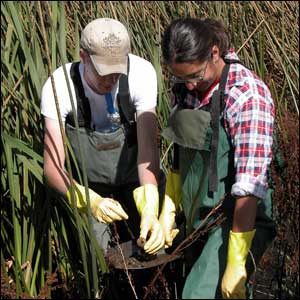Northern Arizona University has received a five-year, $2.9 million grant from the National Science Foundation to establish a multidisciplinary graduate training program called Integrative Biosciences: Genes to Environment.
The Integrative Graduate Education and Research Traineeship grant will help train a new generation of scientists with the technical and professional skills needed to address critical environmental issues, including how genetic information at the scale of molecules affects landscape-level environmental change.
“The grant will help NAU educate well-rounded scientists who are able to bridge gaps between the scientific community and the public,” said Maribeth Watwood, professor of microbiology and principal investigator for the traineeship.
The grant will support multidisciplinary education and research. It will fund new courses focused on topics such as scientific ethics, cultural issues and specialized statistics. It will also support costs for travel, research materials, technical tools, workshops, administrative support and internships on and off campus.
According to Watwood, educating graduates with a broader understanding of their research implications will give them “the edge needed to become leaders in their field.”
An array of research-support facilities will be available to participating students, including the Merriam-Powell Center for Environmental Research, the Colorado Plateau Stable Isotope facility and the Environmental Genetics and Genomics facility.
Watwood said that while the most direct effects of the grant will be on biological sciences and forestry doctoral programs, it will also increase collaborative interaction among the School of Forestry and several departments in the College of Engineering and Natural Sciences.
The selection for the first cohort of six incoming doctoral students this fall is currently under way.
“This is a great example of dollars going directly to support students,” Watwood concluded.



